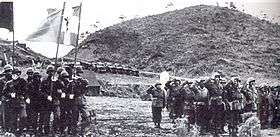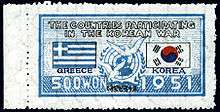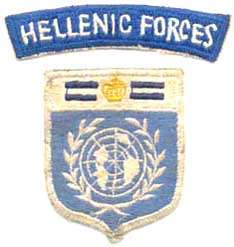Greek Expeditionary Force (Korea)
| Greek Expeditionary Force in Korea Εκστρατευτικόν Σώμα Ελλάδος στην Κορέα | |
|---|---|
|
Shoulder patch of the GEF | |
| Active | November 1950 – May 1958 |
| Country |
|
| Allegiance |
|
| Branch | 355th Transport Squadron, 15th Infantry Regiment |
| Type |
Reinforced Infantry battalion, later regiment Transport aircraft flight |
| Part of |
US 1st Cavalry Division US 3rd Infantry Division |
| Engagements | Korean War |
| Decorations |
|
| Commanders | |
| Notable commanders |
Col. Ioannis Dascalopoulos[1] Lt. Col. Dionysios Arbouzis[2] Lt. Col. Georgios Koumanakos |
The Greek Expeditionary Force (GEF) in Korea (Greek: Εκστρατευτικόν Σώμα Ελλάδος, abbreviated ΕΚΣΕ) was formed in response to the United Nations appeal for assistance in the Korean War. It comprised a reinforced Hellenic Army infantry battalion and a Royal Hellenic Air Force (RHAF) flight of seven transport planes. Greece was the fifth largest troop contributor to U.N. Forces in Korea.[3]
RHAF Transport Flight
The seven C-47s of 13th Flight, with 67 Air Force officers and personnel, departed from Elefsis air base at 0830 on November 11, 1950. They belonged to the 355 Transport Squadron, known for its participation in the recent civil war. The majority of the officers and NCOs of this first mission were experienced airmen, being veterans of the Mediterranean and Middle East Theatre of World War II and the Greek Civil War.
On December 3, 1950, the first Greek aircraft landed on Korean soil. The Greek flight was immediately attached to the 21st Troop Carrier Sqn. (later renamed 6461 TC Sqn.) of the 374th Wing, United States Air Force, based initially at Daegu. From May 14, 1951, the flight was based at Kimpo air base where it remained until May 23, 1955. During its time in Korea, the Greek Flight carried out 2,916 missions, comprising air evacuations, the transport of personnel and prisoners, drops of supplies and ammunition, the replenishment of allied bases and the collection of operational information. In total, its planes carried 70,568 passengers, including 9,243 wounded. It logged 13,777 flight hours. Losses included 12 officers and NCOs and two C-47s.
Sparta Battalion
The Greek government originally intended to send a brigade to Korea, but with quick UN victories in the autumn of 1950, the expeditionary force was downgraded to a battalion.[4] The army unit, called the Sparta Battalion, which was sent in November 1950 under Lieutenant Colonel Georgios Koumanakos, was composed of 849 men and six vehicles in an HQ company and three rifle companies; with one machine gun/mortar platoon and three rifle platoons in each. The men were all volunteers from the 1st, 8th and 9th Infantry Divisions.[5]

From August 23, 1951, the component was expanded to 1,063 men, at which strength it remained until the December 1953 armistice. It was subsequently increased to the level of 2,163 men until April 1955. After the anti-Greek Istanbul Pogrom, in September 1955, relations with Greece's NATO ally, Turkey, deteriorated and Athens decided to recall its units stationed in Korea.[6] As a result, only 191 men were still in the country by December 1955. A representative section of one officer and nine men remained until May 1958.
Battalion events timeline
- 1950
- November 15: Embarkation at Piraeus.
- December 9: Arrival at Busan.[7]
- December 16: Move to Suwon, attached to the US 1st Cavalry Division as the "4th Battalion (GEF), 7th Cavalry Regiment".[5]
- 1951
- January 16: Remnants sweeping operation at Wolaksan, Haseoksan, Munsusan and Sinseol summits.
- January 29: Battle with 3,000 Chinese at Hill 381, west of Icheon.[4]
- February 8: Battle with the Chinese Army at Hill 489, north of Gonjiam-ri.
- March 7: Attack on Hill 326, east of Yongdu-ri.
- April 7: Advance to Geumhaksan, north of Hongchen.
- April 27: Defence of Hongje-dong area of Seoul.
- May 26: Advance to Imjingang via Nogosan and Gamaksan.
- June 9: Advance to Wyoming line, north of Yeoncheon.
- August 4: Battle with the Chinese Army near Churadong area.
- October 3–10: Battle with the Chinese Army at Hill 313 ("Scotch Hill"). The hill was captured on 5 October 5, with 28 KIA.[5]
- December 30: Deployed at Imjingang S-curved area.
- 1952
- January: patrol duties attached to the 15th Infantry Regiment, US 3rd Infantry Division.[5]
- March 17: Battle over Kelly, Nori, Betty outposts.
- May 23: The 1st company guards Kohe-do island prisoner camp.[5]
- July 23: Advance to Imjingang S-curved area again after improving the corps for four months.
- August 7: Surprise attack on Hill 167 near Imjingang.
- September 28: Battle with the Chinese Army near Nori Hill area.
- October 29: Return to the US 9th corps, move to Cheolwon area.
- December 14: Entice and destroy one Chinese company at Yujeong-ri.
- December 27: 14 soldiers killed in a transport aircraft crash in Jinhae.
- 1953
- March 11: Battle between reconnaissance squads at Hill 438.
- May 16: Deployed at Junggasan, north eastern sides of Cheolwon.
- June 16: Battle with the Chinese Army at Hill 420 (Outpost Harry).
- July 16: Battle with the Chinese Army at Hill 495, south of Bukjeon-hyeon.
- July 25: Battle with the Chinese Army at Hill 492, north of Seungam-ri.
Fifteen officers and 168 men were killed in action, while 33 officers and 577 men were wounded.
Awards and recognitions

The 13th Flight received a US Presidential Unit Citation for its participation in the evacuation of US Marines at Hagaru-ri in December 1950.[4] The GEF battalion received its first US Presidential Unit Citation in February 1952 for the capture of Scotch Hill.
The Greek infantry company involved in the defense of Outpost Harry received the following Presidential Unit Citation:
"DEPARTMENT OF THE ARMY Washington D. C., 10 March 1955 GENERAL ORDERS 18
DISTINGUISHED UNIT CITATION Company P Greek Expeditionary Forces Battalion (Second Award) is cited for extraordinary heroism and outstanding performance of duty in action against an armed enemy in the vicinity of Surang-Ni, Korea during the period 17 June to 18 June 1953. Assigned the defense of a vital outpost position (Harry), the company encountered a major enemy assault on the evening of June 17. After an intense concentration of enemy mortar and artillery fire, the hostile forces, which had taken up an attack position on the northeast and northwest side of the outpost, moved rapidly through their own and friendly artillery fire to gain a foothold on the northern slope of the position. Refusing to withdraw, Company P closed in and met the attackers in a furious hand-to-hand struggle in which many of the enemy were driven off. The aggressors regrouped, quickly attacked a second time, and again gained the friendly trenches. Immediately, the Greek Forces launched a series of counterattacks, simultaneously dispatching a diversionary force to the east of the outpost which successfully channeled the enemy thrusts. After 2 hours of close-in fighting, the aggressors were again routed and the friendly positions restored. The outstanding conduct and exemplary courage exhibited by members of Company P, Greek Expeditionary Forces Battalion, reflects great credit on themselves and are in keeping with the finest traditions of the military service and the Kingdom of Greece."
Individual Greeks received six U.S. Distinguished Service Crosses, 32 Silver Stars, 110 Bronze Stars. 19 members of 13th Flight received the US Air Force Air Medal for the Hagaru-ri evacuation operation in December 1950. The Greek battalion's war flag also received the highest Greek military decoration, the Commander's Cross of the Cross of Valour, in 1954.
References
- ↑ http://www.koreanwar-educator.org/topics/national_archives_103.htm
- ↑ Edwards, Paul M. (2006). Korean War almanac (1. ed.). New York: Facts On File. p. 517. ISBN 978-0-8160-6037-5.
- ↑ Βασιλόπουλος (Vasilopoulos), Χρήστος (Christos) (2007). "Οι Έλληνες στον πόλεμο της Κορέας" [Greeks in Korean War]. Η Μηχανή Του Χρόνου (The Time Machine) (in Greek and English). Greece. Event occurs at 6:47. Alpha TV.
- 1 2 3 Sandler (1995), pp. 136–138
- 1 2 3 4 5 Thomas, Abbott & Chappell (1986), pp. 22–23
- ↑ Xydis, Stephen George (1967). Ohio State University Press. Ohio State University Press. p. 161.
- ↑ Edwards (2000), p. 118
Further reading
- Αβτζιγιάννης, Κωνσταντίνος (2005). Η Ελλάδα στον πόλεμο της Κορέας [Greece in Korean War] (in Greek). ΕΠΙΚΟΙΝΩΝΙΕΣ Α.Ε.
- Edwards, Paul M. (2000). To Acknowledge a War: The Korean War in American Memory. Greenwood Publishing Group. ISBN 0-313-31021-1.
- Pagomenos, George; Kazamias, G.A.; Stephanides, Giannis (2004). Το Ημερολόγιο ενός Έλληνα Στρατώτη στον Πόλεμο της Κορέας [The Diary of a Greek Soldier in the Korean War] (in Greek). Μεσόγειος. ISBN 960-406-928-4.
- Papadakis, P.V., (Ed.) (2005). Ελληνικα Φτερα στον Πολεμο της Κορεας [Greek Wings in the Korean War] (PDF) (in Greek). Air Force General Staff – History Service. ISBN 960-87026-2-3.
- Sandler, Stanley (1995). The Korean War: An Encyclopedia. Taylor & Francis. ISBN 0-8240-4445-2.
- Smokovitis, Dimitrios (2009). Caforio, Giuseppe, ed. Greece's contribution to the Korean War (1950–1955) (Chapter Item). 12A. Emerald Group Publishing Limited. pp. 225–232. doi:10.1108/S1572-8323(2009)000012A015. ISBN 978-1-84855-890-8.
- Sŏ, Sŏk-pong (2006). Descendants of Athene: a history of Greek soldiers' participation in the Korean War. Seoul: Ministry of Patriots' and Veterans' Affairs. OCLC 243709579.
- Thomas, Nigel; Abbott, Peter; Chappell, Mike (1986). The Korean War 1950–53. Osprey Publications. ISBN 0-85045-685-1.
External links
| Wikimedia Commons has media related to Greece in the Korean War. |
- Outpost Harry Project
- Outpost Harry Survivors Association
- Article on 13th Transport Flight from the official Hellenic Air Force website (in Greek)
- Royal Hellenic (Greek) Forces
- The 13th Flight of the RHAF in Korea
- The 60th Anniversary Of The Korean War Commemoration Committee
- The Monument for the Participation of Greece in the Korean War
- Heroes of the Korean War: Lieutenant Colonel George Koumanakos (part 1)
- Heroes of the Korean War: Lieutenant Colonel George Koumanakos (part 2)
- A brief history of the Greek Expeditionary Force from the Greek Army (Greek)
- Korea (November 1950-May 1958) (Greek)
- The Greek Expeditionary Force in Korea 1950-1955 (Greek)
Videos
- Βασιλόπουλος (Vasilopoulos), Χρίστος (Christos) (2007). "Οι Έλληνες στον πόλεμο της Κορέας" [Greeks in Korean War]. Μηχανή Του Χρόνου (The Time Machine) (in Greek and English). Greece. Alpha TV.
- "Η Ελλάδα στον Ψυχρό Πόλεμο 1950-1980" [Greece during the Cold War 1950-1980]. Εμείς οι Έλληνες (The Greeks). Episode 12 (in Greek). Greece. 2008. Skai TV.
- Outpost Harry. Archangel Films. Refer to Greeks from 6:42.
- U.N. Greek Battalion In Korea from the British Pathé
